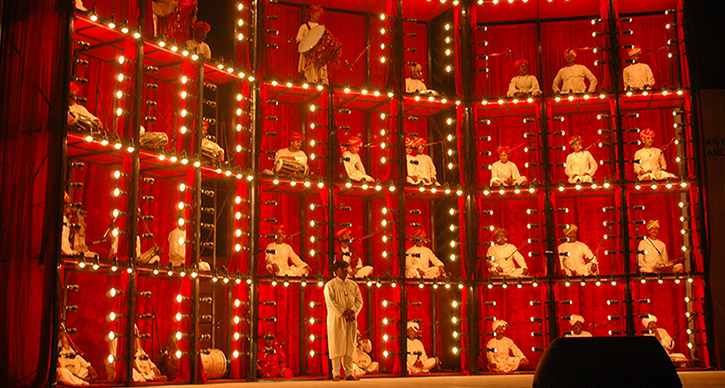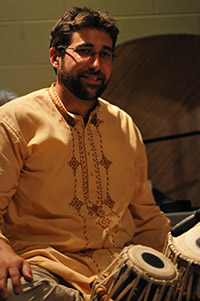UMS Playlist: “Bachs” & “Beethovens” of Indian Classical Music
This post is a part of a series of playlists curated by UMS staff, artists, and community. Check out more music here.

Photo: The Manganiyar Seduction performances kick off University of Michigan “India in the World” theme semester on October 26-27, 2013.
“India has emerged on the world scene in entirely new ways: as one of the world’s most vibrant economies; a key player in geopolitics; the world’s largest democracy; home to the world’s largest “middle class”; the site of one of the world’s largest and most vibrant film industries; a contributor to global trends in art and aesthetics; and “home” to well-established and significant immigrant communities around the world, including the United States.” So begins the description of this winter’s “India in the World” U-M theme semester.
While The Manganiyar Seduction (a “seduction of the spirit” that begins quietly with a solitary desert fiddle, but builds to an ecstatic eruption of sound, light, and color) highlights the folk music tradition of desert musicians from Rajasthan, India, we asked John Churchville, member of Ann Arbor-based Indian classical music ensemble Sumkali, to highlight his favorite Indian classical music picks.
Take a listen to his playlist on Spotify:
 John Churchville is the founder and tabla player for Indian fusion group Sumkali. He is also the Music director at Go Like The Wind School in Ann Arbor and holds a Bachelor of Fine Arts degree in World Music Performance fromCalifornia Institute of the Arts. He is currently persuing his Masters in Music Education degree at the U of M. He hosts a monthly Indian Music Night at Crazy Wisdom Tearoom downtown Ann Arbor and is the music director for the Ann Arbor Kirtan spiritual chanting group is the founder and tabla player for Indian fusion group Sumkali. He is also the Music director at Go Like The Wind School in Ann Arbor and holds a Bachelor of Fine Arts degree in World Music Performance fromCalifornia Institute of the Arts. He is currently persuing his Masters in Music Education degree at the U of M. He hosts a monthly Indian Music Night at Crazy Wisdom Tearoom downtown Ann Arbor and is the music director for the Ann Arbor Kirtan spiritual chanting group
John Churchville is the founder and tabla player for Indian fusion group Sumkali. He is also the Music director at Go Like The Wind School in Ann Arbor and holds a Bachelor of Fine Arts degree in World Music Performance fromCalifornia Institute of the Arts. He is currently persuing his Masters in Music Education degree at the U of M. He hosts a monthly Indian Music Night at Crazy Wisdom Tearoom downtown Ann Arbor and is the music director for the Ann Arbor Kirtan spiritual chanting group is the founder and tabla player for Indian fusion group Sumkali. He is also the Music director at Go Like The Wind School in Ann Arbor and holds a Bachelor of Fine Arts degree in World Music Performance fromCalifornia Institute of the Arts. He is currently persuing his Masters in Music Education degree at the U of M. He hosts a monthly Indian Music Night at Crazy Wisdom Tearoom downtown Ann Arbor and is the music director for the Ann Arbor Kirtan spiritual chanting group
What did you think about this playlist? Share your thoughts or song suggestions in the comments below.
Did you know? The Manganiyar Seduction
Photo: The Manganiyar Seduction on stage.
The Manganiyar Seduction has been described as “Equal parts rock concert, global music performance, and dazzling theatrical experience.” Director Roysten Abel experimented boldly with the Manganiyars, desert musicians from Rajasthan, to create a dazzling union between the Manganiyars’ music and the visual seduction of Amsterdam’s Red Light District.
The performances on October 26-27, 2013 kick off University of Michigan “India in the World” theme semester.
Did you know that…
1. The word Manganiyar can be translated to mean ‘those who ask for alms.’ This is because on various religious and social occasions the musicians go to patrons’ houses and perform. In turn, they are rewarded with such items as grain, animals, or cash. (via)
2. The kamaycha is an indigenous instrument of Rajasthan and is also one of the rarest instruments found in India. It is a bowed string instrument, which is often made of mango wood and covered with goat skin. (via)
3. The music played by the Manganiyars is a mix of Pakistani and classical Hindustani traditions. Many of their ragas are based on Hindustani ragas, while their text is based on Sindhi surs, poetic texts associated with Pakistani music. (via)
4. A game called Kakadi was often played by Manganiyars at patron family gatherings in the past. In this game, the musician uses the ragas to lead the patron to a hidden object. The six ragas considered indigenous to the Manganiyars correspond to the cardinal directions of north, south, east, and west, as well as up and down. The game is becoming less common as musical expertise among patrons decreases, but historically at least one member of the family has been taught how to play the game. (via)
Have you ever attended a global music performance? What got you interested in attending? Share your experiences below.


